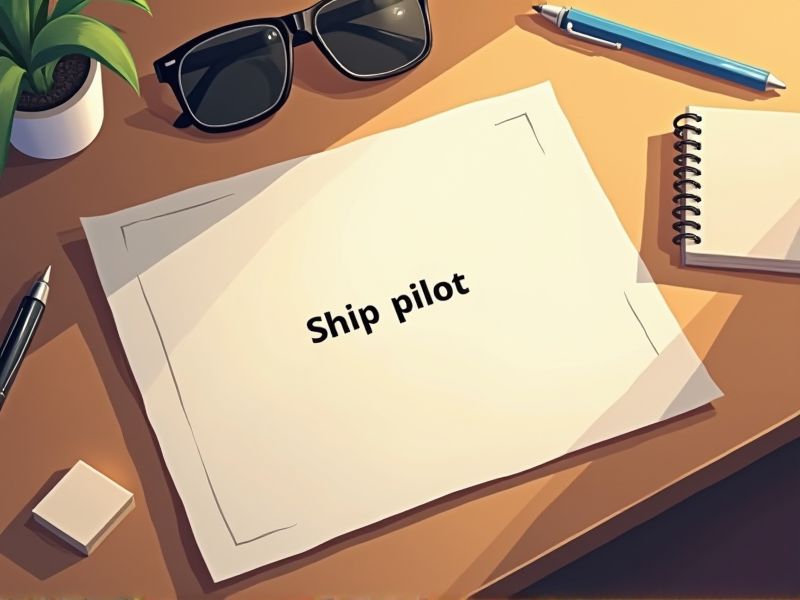
Ship pilots operate large vessels through challenging waters, requiring specialized knowledge and skills. Certifications ensure pilots possess a thorough understanding of navigation, safety protocols, and maritime laws to prevent accidents. Without such certification, the risk of errors increases, which can lead to financial losses or environmental disasters. Here are some essential certifications necessary for a Ship pilot.
Marine Pilot License
A Marine Pilot License is crucial as it certifies the pilot's expertise in navigating specific ports and harbors, ensuring safety and efficiency of vessel movement. Without this license, the risk of accidents due to unfamiliarity with local waters increases significantly, endangering lives and cargo. The license is a regulatory requirement, meaning ships cannot legally operate in certain waters without a licensed pilot on board. By mandating such licenses, maritime authorities maintain high safety and operational standards in critical and congested waterways.
Certificate of Competency
A Certificate of Competency for a ship pilot establishes credibility and ensures the pilot possesses the necessary knowledge to navigate complex waterways. It mandates a thorough understanding of maritime regulations, thus reducing the risk of accidents. Possession of this certification ensures that the pilot has undergone rigorous training and met standardized requirements. Shipping companies benefit from reduced insurance premiums as certified pilots are seen as lower-risk professionals.
STCW Basic Safety Training Certification
STCW Basic Safety Training Certification establishes a standardized level of safety skills essential for ship pilots, ensuring they can effectively respond during emergencies. Ship pilots with this certification contribute to minimizing accidents and enhancing the overall safety of maritime operations. Acquiring the certification aligns pilots with international maritime laws, promoting consistency and compliance. Mastery of these skills develops a pilot's competency in handling hazards, protecting both life and property at sea.
GMDSS Radio Operator Certificate
The GMDSS Radio Operator Certificate is needed for ship pilots because international regulations mandate that they effectively communicate with maritime traffic control and other vessels. This certification ensures that pilots can operate the Global Maritime Distress and Safety System equipment, which is crucial for navigating and managing emergency situations at sea. Without the certificate, a ship pilot may lack the necessary skills to maintain safety standards set by the International Maritime Organization. Furthermore, possessing this certification demonstrates compliance with legal requirements, minimizing the risk of operational delays and penalties.
Advanced Navigation and Ship Handling Certification
Obtaining Advanced Navigation and Ship Handling Certification enhances a ship pilot's ability to effectively manage complex maritime operations, reducing the risk of accidents. The certification ensures that pilots have a comprehensive understanding of modern navigation technologies, which is crucial for effective decision-making. Trained pilots with this certification are better equipped to handle unexpected situations and adverse weather conditions, ensuring the safety of crew and cargo. The certification also aligns with international maritime standards, enhancing the credibility and employability of ship pilots in global markets.
Vessel Traffic Service (VTS) Certification
Vessel Traffic Service (VTS) Certification is needed for ship pilots because it standardizes communication protocols, which ensures efficient and accurate exchange of navigational information between the ship and the shore. This reduces the risk of collisions and other maritime incidents, enhancing overall safety. The certification equips pilots with necessary skills to interpret real-time data, aiding in precise decision-making. It helps to meet international regulations, as many major ports require certified pilots to handle ever-increasing shipping traffic complexities.
Bridge Resource Management Certification
Bridge Resource Management (BRM) Certification enhances situational awareness among ship pilots by training them in effective communication and decision-making. This certification mitigates the risk of human errors, which account for a significant percentage of maritime accidents. By fostering a team-oriented approach, BRM ensures that all crew members are actively involved in navigational safety. The certification elevates operational efficiency on the bridge by integrating advanced resource management practices.
Maritime Security Awareness Certificate
Ensuring ship pilots possess a Maritime Security Awareness Certificate leads to heightened vigilance against potential security threats. This certification provides pilots with knowledge essential for identifying and mitigating risks in maritime environments. Without this awareness, the likelihood of incidents involving unauthorized access or terrorism increases. Consequently, having certified pilots contributes to the overall safety and efficiency of maritime operations.
Environmental Pollution Prevention Certificate
The Environmental Pollution Prevention Certificate ensures that ship pilots operate vessels in compliance with international environmental regulations. Without it, there's an increased risk of oil spills and pollution incidents that can harm marine ecosystems. Ships contribute significantly to air and water pollution, requiring strict adherence to preventive measures. The certificate promotes sustainable maritime practices and holds pilots accountable for minimizing environmental impact.
Maritime Law and Regulations Certification
A Maritime Law and Regulations Certification equips a ship pilot with essential knowledge to navigate legal complexities and ensure compliance with international maritime laws. Inadequate understanding of these regulations can result in significant legal and financial liabilities for shipping companies. Proper certification enhances the safety and security of maritime operations by ensuring pilots understand rules concerning ship navigation, environmental protection, and crew safety. Ship pilots with this certification are better prepared to handle cross-border shipping challenges, thus facilitating smoother international trade.
Summary
When ship pilots acquire specific certifications, you, as a part of the maritime industry, can expect enhanced navigational skills and increased safety measures. Certifications ensure a standardized knowledge base, which reduces the risk of accidents and improves efficiency. With certified pilots, the shipping process becomes more reliable, leading to smoother logistics operations. You also benefit from potentially lower insurance costs due to the decreased likelihood of incidents.
